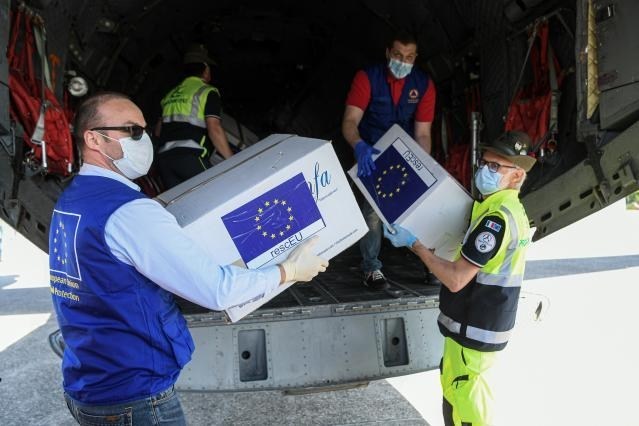An interactive European Solidarity Tracker visualises solidarity during the covid-19 pandemic.
The new tool was presented on Thursday (11 June) by the European Council on Foreign Relations (ECFR), a pan-European think tank. It is an interactive dashboard that collects and illustrates acts of solidarity by the EU member states in the form of medical, economic, and civil-society assistance.
In the beginning of the crisis, solidarity was short on display with national impulses leading to border closures and export restrictions on medical supplies that were lifted only as the crisis continued to unfold.
The European Commission eventually assumed a critical role in coordinating Europe’s response to the crisis. According to ECFR, the data contradicts the widespread assumption that the European level is largely irrelevant for crisis management and that European solidarity was not actively pursued during the pandemic.
The Solidarity Tracker shows the role of civil society during the crisis and the extent to which even small member states showed solidarity, cooperated with their neighbours and partners, and provided help in this crisis.
“At the beginning of the crisis, we saw how quickly the impression of a lack of solidarity can lead to an erosion of European cohesion: lack of cohesion leads to disintegration and the dissolution of the European project,” explains Dr Jana Puglierin, project leader and head of ECFR’s Berlin office.
“With the European Solidarity Tracker, we want to show that the EU showed solidarity quickly and decisively during the crisis – after many initial difficulties.”
Data manager Rafael Loss told The Brussels Times that the Solidarity Tracker includes more than 500 data points on the 27 EU member states as well as the EU institutions and European civil society.
The number of recorded solidarity actions vary by country, with Germany (49 actions), France (25) and Hungary (21) in the lead. Is it possible to “rank” the countries?
“Because the data is not definitive, the Solidarity Tracker can only indicate how Europeans have responded to the coronavirus crisis. The Tracker therefore does not allow for countries to be ranked against each other or against the EU institutions, neither by the number of actions nor by their financial value,” Rafael Loss replied.
Some of the actions were prompted by actions or requests from the European Commission or other EU institutions. For example, member states pledged substantial funds to the collective research effort in search of a vaccine to the novel coronavirus at the EU’s donor conference. Others resulted from member states or civil society actors wanting to help their fellow Europeans.
The Tracker shows that member states were willing to share resources when capacities were scarce. Germany, Austria and Luxembourg treated foreign patients when no one could fully foresee how the health crisis would unfold. However, many member states resorted to unilateral border closures and export restrictions on medical supplies in the early days of the crisis.
“The European Commission had to remind France, Germany, and other EU countries that such measures would stymie any collective European response,” says Loss. “This only shows the complexity of the situation and of the definitions of solidarity one can apply to these developments.”
To what extent did member states show solidarity with third countries (non-EU members)?
“While EU member states, EU institutions, and European civil society have shown solidarity with third countries – China was an early recipient of substantial amounts of medical supplies from Europe when it was first hit by the novel coronavirus – data on third countries are not included in the Solidarity Tracker at this time.”
As the tool evolves and receives updates over the next months, data on third countries may successively be added.
M. Apelblat
The Brussels Times

